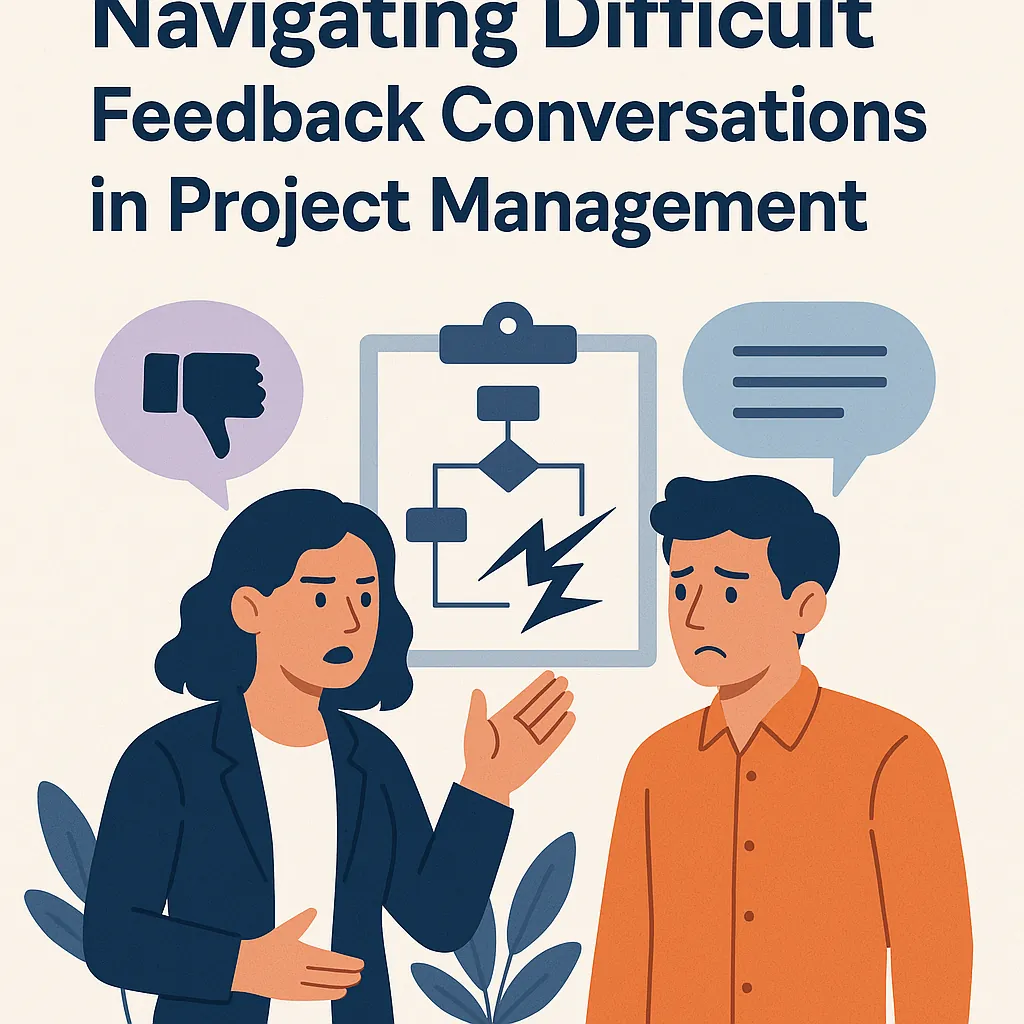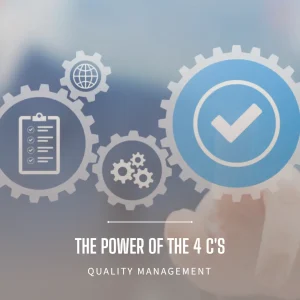Introduction
Feedback serves as a critical tool for fostering growth, enhancing performance, and ensuring project success. It is not merely a mechanism for evaluating team members but a vital component that shapes team dynamics and influences overall project outcomes. Effective feedback can guide project managers in steering their teams toward achieving objectives while also nurturing a collaborative and positive work environment.
However, new and intermediate project managers often encounter significant challenges when it comes to delivering feedback. The fear of damaging relationships or creating conflict can lead to hesitance in addressing performance issues. This apprehension is compounded by the need to maintain team morale and cohesion, which can be particularly delicate in high-pressure project settings. As a result, many project managers may find themselves avoiding difficult conversations, which can ultimately hinder both individual and team performance.
To navigate these complexities, it is essential to strike a balance between performance improvement and relationship preservation. Project managers must develop strategies that allow them to provide constructive feedback while also fostering an atmosphere of trust and respect. By approaching feedback conversations with empathy and clarity, project managers can not only address performance issues effectively but also strengthen their relationships with team members. This dual focus on improvement and connection is crucial for cultivating a resilient and high-performing project team.
Understanding the Importance of Feedback
Feedback is a cornerstone of effective project management, playing a vital role in driving team performance and ensuring project success. For new and intermediate project managers, understanding the significance of feedback can transform how they lead their teams and navigate challenges.
- Driving Team Performance and Project Success: Feedback serves as a critical tool for enhancing team performance. It allows project managers to identify areas where team members excel and where improvements are needed. By providing timely and specific feedback, managers can help team members align their efforts with project goals, ultimately leading to higher productivity and better outcomes. Regular feedback fosters a culture of accountability and continuous improvement, which is essential for the success of any project [1][13].
- Constructive Feedback for Growth: Constructive feedback is not just about pointing out flaws; it is an opportunity for personal and professional growth. When delivered effectively, feedback can motivate employees to enhance their skills and performance. It encourages self-reflection and helps individuals understand their strengths and weaknesses. This process of growth is crucial in a project environment where adaptability and learning are key to overcoming challenges and achieving objectives [9][14].
- Consequences of Avoiding Difficult Conversations: Avoiding difficult feedback conversations can have significant repercussions. When project managers shy away from addressing performance issues, it can lead to unresolved problems that may escalate over time. This avoidance can damage team dynamics, erode trust, and ultimately hinder project progress. Team members may feel unsupported or unclear about expectations, which can result in decreased morale and productivity. Therefore, it is essential for project managers to embrace these conversations as a necessary part of their role, ensuring that they are approached with care and consideration to maintain healthy working relationships [4][10][15].
Recognizing When Feedback is Needed
Recognizing the right moments to provide feedback is crucial for maintaining team dynamics and ensuring project success. Here are some key points to consider:
Common Signs of Performance Issues
Project managers should be vigilant for several indicators that may signal performance issues within their teams:
- Missed Deadlines: Consistently failing to meet deadlines can indicate a lack of understanding of tasks, poor time management, or external obstacles that need addressing. This is often a clear sign that feedback is necessary to realign expectations and support the team member in overcoming challenges [11].
- Quality Concerns: If the quality of work is declining, it may reflect a need for additional training, resources, or motivation. Addressing these concerns promptly can help prevent further issues and maintain project standards [3].
- Decreased Engagement: A noticeable drop in team members’ enthusiasm or participation can be a red flag. This may stem from personal issues, unclear roles, or dissatisfaction with the project, all of which warrant a feedback conversation [12].
- Increased Conflicts: If conflicts among team members are rising, it may indicate underlying performance issues or miscommunications that need to be addressed through constructive feedback [10].
Importance of Timely Feedback
Providing feedback in a timely manner is essential for several reasons:
- Prevention of Escalation: Addressing performance issues early can prevent them from escalating into larger problems that could jeopardize the project. Timely feedback allows for adjustments to be made before issues become entrenched [11].
- Fostering a Culture of Open Communication: Regular feedback encourages a culture where team members feel comfortable discussing challenges and seeking help. This openness can lead to improved collaboration and innovation [10].
- Enhancing Performance: When feedback is given promptly, it can lead to immediate improvements in performance. Team members are more likely to adjust their behaviors and strategies when they receive timely guidance [15].
Encouraging Self-Reflection
Project managers should also engage in self-reflection regarding their own performance and biases:
- Assessing Personal Performance: Before providing feedback to others, project managers should evaluate their own contributions to the project. This includes considering whether they have set clear expectations and provided adequate support to their team [5].
- Recognizing Biases: It’s important for project managers to be aware of their own biases that may affect their perception of team members’ performance. Self-reflection can help ensure that feedback is fair, objective, and focused on behaviors rather than personal attributes [7].
By recognizing the signs of performance issues, understanding the importance of timely feedback, and engaging in self-reflection, project managers can navigate difficult feedback conversations more effectively. This approach not only addresses performance concerns but also helps maintain and strengthen relationships within the team.
Preparing for the Feedback Conversation
Navigating difficult feedback conversations is a critical skill for project managers, especially for those who are new or at an intermediate level. Preparing effectively can help ensure that these discussions are constructive and do not damage relationships within the team. Here are some actionable strategies to get ready for these challenging conversations:
- Gather Relevant Data and Examples: Before initiating a feedback conversation, it is essential to collect all necessary facts, feedback, and documentation. This preparation allows you to present specific examples of performance issues, which can help keep the discussion focused and objective. Reviewing relevant performance data, project outcomes, or specific incidents will provide a solid foundation for your feedback, making it easier for the team member to understand the context and the need for improvement [12].
- Define Clear Objectives for the Conversation: Establishing clear objectives is crucial for guiding the conversation. Determine what you want to achieve from the discussion, whether it’s addressing a specific performance issue, setting new expectations, or fostering a more open line of communication. By having a clear goal in mind, you can steer the conversation effectively and ensure that both you and the team member leave with a mutual understanding of the next steps [11].
- Practice Active Listening and Empathy: Engaging in active listening is vital during feedback conversations. This means not only hearing what the team member says but also understanding their perspective and feelings. Demonstrating empathy can help create a safe environment for open dialogue, encouraging the team member to share their thoughts and concerns. This two-way communication fosters a more collaborative atmosphere, which can lead to better outcomes and stronger relationships [11][10].
By implementing these strategies, project managers can approach difficult feedback conversations with confidence and clarity, ultimately leading to improved performance and team dynamics.
Delivering Feedback Effectively
Navigating feedback conversations can be particularly challenging for project managers, especially when addressing performance issues. However, with the right strategies, these discussions can be constructive and maintain healthy working relationships. Here are some key points to consider when delivering feedback effectively:
- Utilize the ‘Sandwich’ Method: This approach involves framing your feedback by starting with positive comments, followed by constructive criticism, and concluding with more positive reinforcement. This method not only softens the impact of the criticism but also helps the recipient feel valued and appreciated. By highlighting strengths before and after discussing areas for improvement, you create a balanced perspective that encourages growth without diminishing morale [2][11].
- Maintain a Calm and Respectful Tone: The tone of your conversation plays a crucial role in how feedback is received. By maintaining a calm and respectful demeanor, you foster a safe environment where team members feel comfortable discussing their performance. This approach helps to minimize defensiveness and promotes openness, allowing for a more productive dialogue [3][4].
- Encourage Two-Way Dialogue: Engaging the recipient in the conversation is essential for effective feedback. Encourage them to share their thoughts and feelings about the feedback provided. This two-way dialogue not only empowers the individual but also helps you gain insights into their perspective, which can lead to a more collaborative approach to addressing performance issues. Listening actively and asking open-ended questions can facilitate this exchange and strengthen the relationship [10][12].
By implementing these strategies, project managers can navigate difficult feedback conversations with confidence, ensuring that performance issues are addressed constructively while preserving team dynamics. This approach not only enhances individual performance but also contributes to a positive and productive project environment.
Addressing Emotional Reactions
Navigating feedback conversations can be particularly challenging for project managers, especially when performance issues arise. It is essential to recognize that feedback can often trigger defensiveness or emotional reactions in team members. Understanding this dynamic is crucial for maintaining healthy working relationships while addressing performance concerns.
Acknowledge Emotional Triggers
Feedback sessions can evoke strong emotional responses, including defensiveness, anxiety, or frustration. Acknowledging that these reactions are natural is the first step in managing them effectively. By creating an environment where team members feel safe to express their emotions, project managers can foster open dialogue and reduce the likelihood of conflict. This approach not only helps in addressing the immediate feedback but also strengthens the overall team dynamic [1][11].
Strategies for Managing Emotional Responses
- Stay Calm and Empathetic: As a project manager, maintaining a composed demeanor is vital. Your calmness can help set the tone for the conversation, encouraging team members to respond in kind. Empathy plays a crucial role; by validating their feelings, you demonstrate that you are listening and that their emotions are acknowledged [5][12].
- Use Active Listening Techniques: Engage in active listening by summarizing what the team member has said and reflecting it back to them. This not only shows that you are paying attention but also helps clarify any misunderstandings. It can also help the individual feel heard, which may reduce their emotional response [9].
- Provide Breaks if Needed: If emotions run high, it may be beneficial to pause the conversation. Allowing a short break can give both parties time to process the feedback and return to the discussion with a clearer mindset. This strategy can prevent escalation and promote a more constructive dialogue [1][5].
- Encourage Expression of Feelings: Create a space where team members feel comfortable expressing their emotions. Encourage them to share their thoughts on the feedback and how it makes them feel. This can lead to a more productive conversation and help in addressing the underlying issues [10].
Importance of Patience
Patience is a critical component when addressing emotional reactions during feedback conversations. It is essential to allow team members the time they need to process the feedback. Rushing through the conversation can lead to misunderstandings and resentment. By giving them space to reflect, you demonstrate respect for their feelings and promote a more thoughtful response [3][12].
In conclusion, effectively managing emotional reactions during feedback conversations is a vital skill for project managers. By acknowledging emotional triggers, employing strategies to maintain calmness and empathy, and exercising patience, project managers can navigate these challenging discussions without damaging relationships. This approach not only enhances communication but also contributes to a more cohesive and resilient team environment.
Following Up After Feedback
Navigating the complexities of feedback conversations is a critical skill for project managers, especially when addressing performance issues. Following up after providing feedback is essential not only for ensuring that the feedback is understood and acted upon but also for maintaining and strengthening relationships with team members. Here are some strategies and insights to consider:
Setting Goals and Expectations Post-Feedback
- Define Clear Objectives: After delivering feedback, it is crucial to establish specific goals that the team member should aim for. This involves translating the feedback into actionable steps with clear objectives and a timeline for completion. By doing so, you provide a roadmap that helps the individual understand what is expected of them moving forward [2][9].
- Collaborative Goal Setting: Engage the team member in the goal-setting process. This collaborative approach not only empowers them but also ensures that the goals are realistic and aligned with their capabilities. It fosters a sense of ownership and accountability, which can enhance motivation and performance [11].
Importance of Regular Check-Ins
- Monitor Progress: Regular check-ins are vital for tracking the progress of the goals set after the feedback session. These meetings can be brief but should focus on discussing the action items and any challenges the individual may be facing. This ongoing dialogue helps to keep the team member on track and reinforces the importance of the feedback provided [15].
- Adjust Goals as Necessary: During these check-ins, be open to adjusting goals based on the team member’s progress and any unforeseen challenges. Flexibility in expectations can demonstrate your support and understanding, which is crucial for maintaining a positive working relationship [12].
Encouraging Open Communication
- Foster a Safe Environment: Encourage team members to share their thoughts and feelings about the feedback and the changes they are implementing. Creating a safe space for open communication reinforces trust and shows that you value their input. This can lead to more honest discussions about performance and areas for improvement [7][10].
- Follow-Up on Feedback Implementation: After some time has passed, follow up specifically on how the team member has implemented the feedback. This not only shows that you care about their growth but also reinforces the importance of the feedback process. It can also provide an opportunity to celebrate successes and discuss any remaining challenges [12][10].
Building a Feedback Culture
Creating a culture of open feedback within project management is essential for fostering continuous improvement and maintaining healthy relationships among team members. Here are some key points to consider:
Benefits of a Feedback Culture
- Enhanced Communication: An environment where feedback is normalized encourages team members to communicate openly. This transparency can lead to better collaboration and understanding among team members, ultimately improving project outcomes [10].
- Continuous Improvement: Regular feedback allows teams to identify areas for improvement and adapt quickly. This iterative process helps in refining processes and enhancing overall performance [10].
- Stronger Relationships: When feedback is delivered constructively, it can strengthen relationships within the team. Team members feel valued and heard, which fosters trust and respect [15].
Encouraging Feedback Among Team Members
- Model Openness: As a project manager, demonstrate your willingness to receive feedback. Share your experiences and how you have used feedback to improve your own performance. This sets a precedent for team members to follow [6].
- Create Safe Spaces: Establish an environment where team members feel safe to express their thoughts without fear of retribution. Use open-ended questions to facilitate discussions and focus on points of agreement to build rapport [5][6].
- Utilize “I” Statements: Encourage team members to use “I” statements when giving feedback. This approach helps in expressing personal feelings and observations without sounding accusatory, making it easier for others to receive the feedback positively [5].
The Role of Regular Team Retrospectives and Reviews
- Structured Reflection: Regular retrospectives provide a structured opportunity for team members to reflect on their work and share feedback. This practice not only helps in identifying successes and areas for improvement but also reinforces the importance of feedback as a continuous process [12].
- Facilitating Open Dialogue: Team reviews should be designed to encourage open dialogue. By discussing both positive and negative aspects of the project, team members can learn from each other’s experiences and insights, fostering a culture of collective growth [10][14].
- Feedback Role Play: Implementing feedback role play scenarios can help team members practice giving and receiving feedback in a safe environment. This exercise can enhance their skills and confidence in handling real-life feedback situations [8].
Conclusion
Navigating difficult feedback conversations is a critical skill for project managers, especially for those who are new or in the intermediate stages of their careers. As we have explored, the balance between improving performance and maintaining strong relationships is essential for fostering a productive team environment. Here are the key takeaways to remember:
- Balancing Performance Improvement with Relationship Management: It is vital to approach feedback with a mindset that values both the individual’s growth and the overall team dynamics. Addressing performance issues promptly and constructively can prevent misunderstandings and resentment, ultimately leading to a more cohesive team [11][12].
- Embracing Feedback as a Tool for Growth: Feedback should not be viewed as a punitive measure but rather as an opportunity for development. By fostering a culture that encourages open communication and constructive criticism, project managers can help their teams thrive. Recognizing achievements and modeling desired behaviors can significantly enhance motivation and performance [7][10].
In conclusion, mastering the art of delivering feedback is essential for any project manager aiming to lead effectively. By prioritizing relationship management alongside performance improvement, you can navigate these challenging conversations with confidence and compassion, ultimately driving your team toward greater success.
Find out more about Shaun Stoltz https://www.shaunstoltz.com/about/.
This post was written by an AI and reviewed/edited by a human.



